Interreligious Symposium Unites Scouting in the Central African Republic
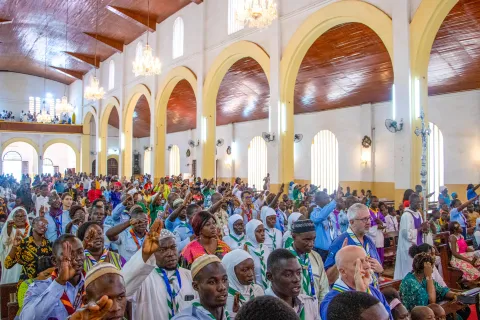
The three-day first Africa Scout Interreligious Symposium held in Bangui, Central Africa Republic from 17-19 March 2023 brought together 57 Scout leaders, government representatives and partners of Scouting from 8 countries (Cameroon, Central Africa Republic, Congo, Côte d’Ivoire, Gabon, France, Madagascar, and Mali) with a call for unity and togetherness for peace and the well-being of society.
Organized by the World Scout Bureau Africa Support Centre and hosted by Association Nationale des Scouts de Centrafrique (ANSCA) who have been actors toward promoting dialogue for peace through their project their project “Bâtir la Paix en Centrafrique” in partnership with Scout et Guides de France in a country that has recently known conflicts with strong religious connotations.
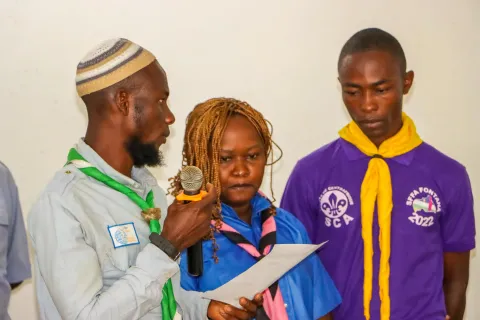
Kick-Starting the Dialogue
Speakers at the opening ceremony graced by the CAR Minister for Youth, Hon. Mbaya Alain affirmed the benefit of the symposium and challenged the Scouts to “rise up and bring harmony to the country.”
“If we can hear and accept each other then we will beat hatred and violence. Scouting is about shared values and thanks to our experiences and exchanges we will find solutions to grow our fraternity,” said Oug-ba Ben Nafi, National Chaplain of the Central Africa Muslim Scout Association,
The Regional Director, Frederic Tutu Kama-Kama while describing CAR as “hope for the future of Africa” reminded participants that Scouting aims to “create a better world” – that is more peaceful and sustainable – and that all must to work collaboratively to achieve that goal.
Abbe Capistrand, President of the Organization Committee and Chaplain of The Central Africa Catholic Scouts Association also reminded participants that “peace is a necessity for all human societies and that interreligious dialogue can help build a world with more harmony.”
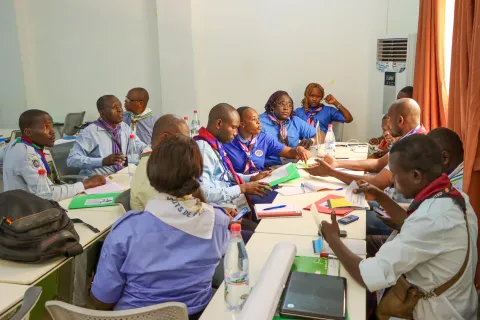
Sharing of Best Practices
A roundtable discussion introduced existing and active interreligious platform in CAR, represented by Imam Abdoulaye Ouasselegue, and Chaplain Guy Clotaire who presented the key role of this platform with their projects aiming at helping communities living alongside each other to co-exist peacefully. They emotionally talked about the difficulties recently faced by the country and the role the Scouts have continued to play in maintaining peace by sensitizing the communities and reconstructing the perception of others.
Miguel Olaverri, Archbishop of Pointe-Noire, President of Caritas Congo Brazzaville also shared his experiences and the importance of youth movements as actors for peace. He reminded everyone of the power, even stronger as Scouts, of “walking together” and the role of youth empowerment, leadership, and peace education for future generations.
Other participants from Association Nationale des Guides de Centrafrique (ANGCA) and Scouts et Guides de France also shared how they’re unifying girls regardless of cultural or religious distinctions, and interreligious dialogue training for adults respectively.
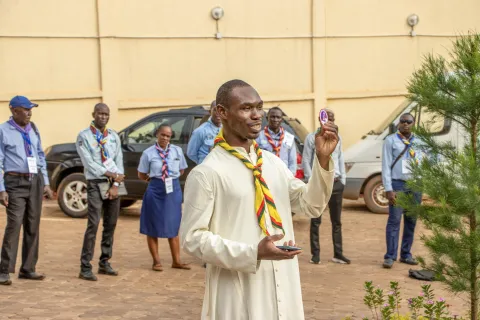
Building Capacities for Dialogue
Dialogue creates communication bridges between people, groups and communities from different cultures and religions aiming at transforming intolerance relations, prejudices and misunderstanding in peace. Participants to the symposium had the opportunity, with facilitation from KAICIID’s representative in CAR Boris Yakoubou, to learn more about interreligious and intercultural dialogue by redefining dialogue, understanding the importance of listening, understanding, and recognizing differences and others’ perspectives.
“Recognize and promote the “us” instead of the “them.”” This is what the participants demonstrated by exchanging together on the principles and conditions of dialogue. They also put their contributions and work to finding the best application contexts, perspectives, and challenges to interreligious and intercultural dialogue. They were empowered with knowledge and reflected on the best practices to use dialogue as a mean of transforming conflict into peace.
As part of the interreligious exchange, participants visited Alfarouq Mosque where they were welcomed and took part in the Friday prayer. This powerful and emotional moment offered the opportunity for all to discover and understand this important Muslim religious practice. Scouting was recognized as a movement of peace, strongly encouraged, and supported by the leaders receiving the participants at the Mosque. They also took part in the Sunday mass at the Cathedral Notre Dame Immaculé Conception de Bangui. Scouts again showed their unity and acceptance towards each other’s traditions, and their will of sharing powerful and inclusive moments as a movement. These two exchanges came out in the evaluation as the best experiences of the symposium.
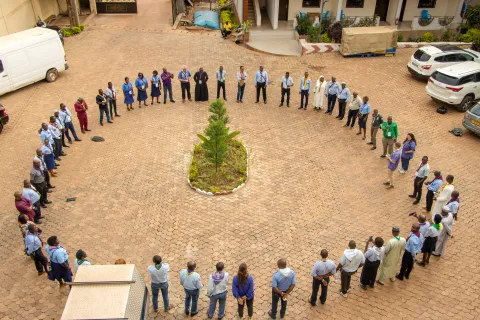
United for a Better Future
The Interreligious Symposium is founded on the fundamental principles of Scouting of Duty to God (adherence to spiritual principles, loyalty to the religion that expresses them and acceptance of the duties resulting therefrom), Duty to others (loyalty to one’s country in harmony with the promotion of local, national, and international peace, understanding and cooperation; and participation in the development of society with recognition and respect for the dignity of humanity and for the integrity of the natural world), and Duty to self (responsibility for the development of oneself).
This first edition in Africa, built on Scouting’s shared values that continue to bridge differences and make diversity a source of massive strength and energy instead of a source of division and violence. It contributed to growing Scouting among religious communities in the Central African Republic and beyond.
In the end, participants committed to be actors of dialogue and peace and to engage their communities beyond the symposium through a declaration, which read as follows:
“We, participants of the first Africa Scout Interreligious Symposium, commit ourselves to work daily for peace and fraternal dialogue between peoples, by becoming ambassadors of interreligious dialogue within our communities.
We commit to promote listening and to apply the principles of dialogue in the resolution of conflicts, whatever they may be. In doing so we will fulfill the three duties of Scouting: to God, to others and to ourselves.”
This marked a great step for Scouting in Africa, and towards a better future where peace and social cohesion is promoted within the society.
Hosting the symposium in CAR contributed to moving ANSCA closer to rejoining the World Organization of the Scout Movement (WOSM) by bringing together the various Scout groups in the country and epitomizing the prospects that the gathering offers. It helped allay fear of losing one’s religious identity and enabled the Association to understand the need for developing capacities to offer an education programme that responds to the aspirations of its members. It also contributed in smoothening the positions of stakeholders as the association finalizes its constitution, internal regulations and policies in line with WOSM requirements.
Written by Julie Poitevineau with contributions from Frederic Kama-Kama. Edited by Nelson Opany